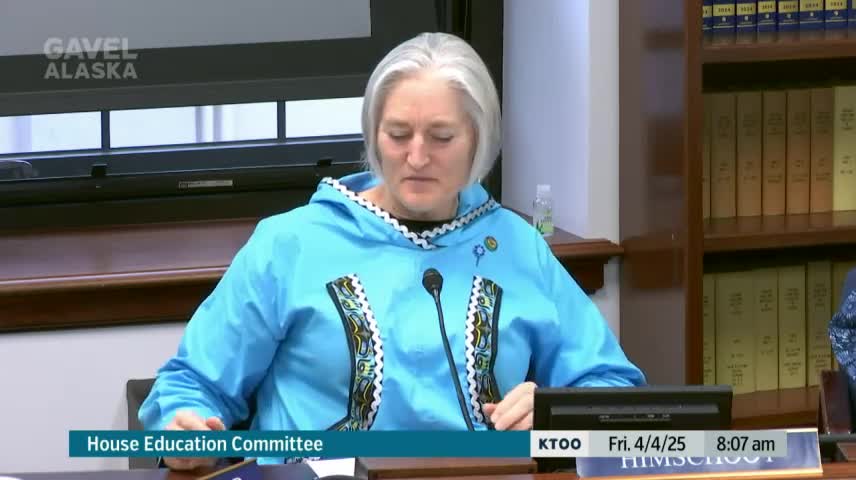Alaska bill would require a half‑credit financial‑literacy course for high school graduation
Get AI-powered insights, summaries, and transcripts
Subscribe
Summary
Representative Ted Eisheide introduced House Bill 90 to require a 0.5‑credit financial literacy course for grades 9–12, with DEED to approve vetted open‑source materials; the committee scheduled further public testimony and set a tentative amendment deadline.
Juneau — Representative Ted Eisheide on April 4 introduced House Bill 90, a measure that would add a 0.5 credit financial‑literacy requirement for Alaska public high school graduation and direct the Department of Education and Early Development (DEED) to prepare and approve a list of vetted open educational resources to help districts implement the coursework.
The bill “seeks to ensure that Alaska’s public education system helps prepare young Alaskans to lead financially secure, stable adult lives,” Eisheide said. He said the course would teach budgeting, credit and credit scores, managing debt, loan applications, basic insurance and taxes, fraud avoidance, and other topics used in everyday adult life.
Eisheide said the requirement would apply to students in grades 9–12 and that the proposed half‑credit is the equivalent of 60 to 90 hours of instruction. "A half credit course is defined as, offering instruction that results in 60 to 90 hours of instruction," he said.
Why it matters: Eisheide and supporters framed the bill as an equity measure that would standardize financial instruction statewide. He noted that some Alaska districts already offer financial literacy, but that instruction is not uniform: “financial literacy is being offered in some schools, such as in the Haines School District and my district, the Anchorage School District, but it has not been standardized, statewide,” Eisheide said. He cited national and state figures discussed at the hearing, including an average per‑person credit card debt figure he placed at about $8,000 and average student‑loan debt in Alaska he quoted at roughly $35,000.
What the bill would do: HB 90 would add a new section to AS 14.30 (relating to public schools) directing school districts to establish and provide a financial‑literacy education program equivalent to a half credit for grades 9–12. The bill would require DEED to prepare and approve a list of available open educational resources that meet the statute’s requirements and would allow local districts flexibility to deliver the content as a standalone course or integrated across existing courses. The bill includes an exemption for transfer students who cannot reasonably complete the coursework and sets an applicability date that DEED and schools could use in implementation.
Implementation and fiscal notes: Staff explained the bill includes a one‑time fiscal impact tied to developing the rubric and vetting materials; DEED would review the approved materials every five years. Eisheide described the vetting process as a stakeholder‑driven rubric applied to open‑source curricula and said the intent is to limit the implementation burden on individual schools by putting primary development and curation responsibility on DEED.
Committee questions and concerns: Committee members supported the goal but raised operational concerns. Members asked whether DEED already approves curricula elsewhere in statute, how many districts currently offer financial literacy, how the program would affect staffing and district budgets, and whether the graduation requirement might impose unintended consequences. Eisheide and his staff said the requirement is not a testing mandate and that the intent is local flexibility (integration into math, social studies, or a standalone class) but acknowledged district capacity concerns and the bill’s potential fiscal implications. Representative Schwanke asked whether similar DEED approval language exists in statute; Eisheide said the mental‑health education work had used a stakeholder rubric and that the bill’s language was intended to replicate that collaborative approach.
Next steps: The committee concluded consideration of HB 90 and scheduled the bill for further work and public testimony at the next meeting; staff announced the committee expects to hear the bill again on Monday and mentioned a tentative amendment deadline of a Wednesday in April at 5 p.m., with the committee noting that the precise date was not specified. No formal motion or vote on the bill took place during the April 4 meeting.
Sources and attribution: Quotes and attributions in this article come from Representative Ted Eisheide and Meredith Trainor (staff), as recorded in the House Education Committee hearing on April 4, 2024.
